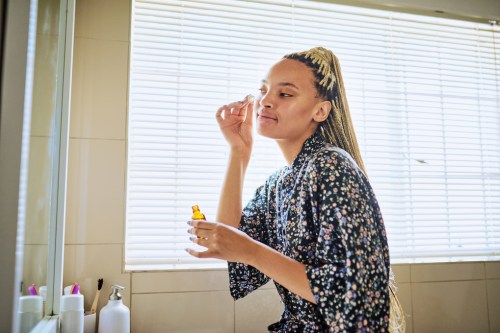Were skin care a feature film, active ingredients would for sure be the main characters, while everything else on a product list is playing a supporting role. They are the main players that make or break the success of serums, masks, moisturizers and other topical treatments. Yet somehow, the term “active” is kind of elusive, no? So what exactly defines a skin-care “active” and how do you know which products that contain them are legit worth the investment?
There’s a lot to unpack here, so I tapped two experts who used to make and formulate skin-care products for huge brands. Gloria Lu and Victoria Fu are skin-care formulation chemists, founders of Chemist Confessions, and authors of the book Skincare Decoded. Below they break down everything you need to know about skin-care actives, including which ones are the most important—and how to know which products you can skip.
What, exactly, is an active ingredient?
The term “active” is generally accepted across the beauty and skin-care industry as the main ingredient in a product that delivers a a long-term benefit beyond the basics, such as cleansing or moisturizing, explains Lu. This could be brightening, soothing, reducing visible lines or wrinkles, or reducing hyperpigmentation, for example.
But the term isn’t regulated, so the specific way the ingredient works can vary. “To be honest, there isn’t a standard test that qualifies an ingredient as an ‘active,’” Lu says. “It’s up to the chemists, researchers, and brand founders to do their due diligence to make sure that the ingredient will perform to their claimed function.”
How do you know how potent an active is?
Given the lack of standardization across the industry, it isn’t always clear how effective skin-care actives are from product to product. To start, every active ingredient has a different ideal potency, and more isn’t necessarily always better. “For example, there’s a lot of data on niacinamide’s activity between two percent to five percent,” Lu says. “It’s a decent bet that a brand that has a product with niacinamide in that neighborhood will work.”
This Parisian Skincare Brand Is Launching in the United States for the First Time—Here’s What a Derm Wants You to Know

We’re Calling It: Cleansing Balms Are the Face Wash of the Future—Here Are 3 to Add to Your Cart

This Is the One Product That Scarlett Johansson Always Keeps in Her Purse and on Her Bedside Table

But you may not always be able to figure out an ingredient’s potency or effectiveness just by glancing at a product label. “This is very difficult for a consumer to really know,” Lu explains. “There are two metrics we typically use: transparent concentrations and clinical testing.” Even then, looking at concentrations is not always straightforward as it seems. “Transparent concentrations sometimes get carried away, and the numbers can be misleading or possibly too high, leading to unwanted irritation, which is why it can be challenging for users since you have to do a little homework and read between the lines,” says Lu.
So what can you do to check into how legit your skin-care active is? First, you can always consult with your dermatologist if you’re unsure about what product is right for your needs. Otherwise, when in doubt, don’t be afraid to dig into the clinical testing information on a product or brand’s website, which is Lu’s and Fu’s advice. “We’d recommend looking to clinical tests done by the brand to give you a better picture,” Lu says. “We give brands major brownie points for conducting clinicals because these tests can get expensive.”
Key actives to know
Lu and Fu recommend getting to know the “Big 4” actives, aka the major active ingredients that most people recommend. Although not an exhaustive list, the basics are vitamin C, retinol, alpha hydroxy acid (AHA), either glycolic or lactic acid, and the aforementioned niacinamide. “These have the longest history of studies that try to understand the mechanism of how they work topically and countless clinicals testing their skin benefits,” Fu says. Other notable actives include hyaluronic acid, BHA’s, peptides, and ceramides.
If you’ve never tried an active ingredient before, the golden rule is to start slow and see how your skin reacts. “For example, if you’re new to retinol, a good place to begin is a lower concentration product—approximately 0.1–0.3 percent—roughly 2-3 times a week. See how your skin responds. If your skin responds well without excessive irritation, you can bump up the frequency,” says Fu.
And no matter what active you try, don’t forget sun protection (here are 42 of the best sunscreens, BTW). “With or without active ingredients, you should use a sunscreen daily. However, with an actives’ heavy routine, it’s even more important to get that sunscreen routine right,” says Fu.
Oh hi! You look like someone who loves free workouts, discounts for cutting-edge wellness brands, and exclusive Well+Good content. Sign up for Well+, our online community of wellness insiders, and unlock your rewards instantly.
Sign Up for Our Daily Newsletter
Get all the latest in wellness, trends, food, fitness, beauty, and more delivered right to your inbox.
Got it, you've been added to our email list.








